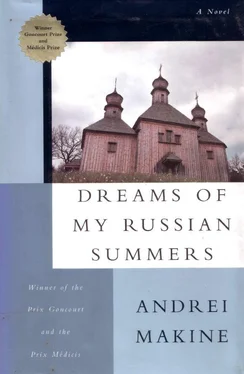As for Albertine, supposed victim of bourgeois morality, she was soon to be standing on the slippery brink of an open grave into which the first spadefuls of earth were already flying. She would struggle so violently against the hands that restrained her and would utter such heartrending cries that even the funeral party of Russians, in that cemetery in a distant Siberian town, would be stunned by them. Accustomed as they were to tragic outbursts at funerals in their native land, to torrential tears and pitiful lamentations, these people would be stricken in the face of the tortured beauty of this young Frenchwoman. She would flail above the grave, crying out in her resonant language, "Throw me in as well! Throw me in!"
For a long time this terrible lament echoed in our childish ears.
"Perhaps it was because she… she loved him," my sister, who was older than me, said to me one day. And she blushed.
But more than that unusual union between Norbert and Albertine, it was Charlotte, in this photo from the turn of the century, who aroused my curiosity. Especially her little bare toes. By a simple irony of chance, or through some involuntary coquetry, she had curled them back tightly against the soles of her feet. This trifling detail conferred a special significance on what was overall a very ordinary photo. Not knowing how to formulate my thought, I contented myself with repeating in a dreamy voice, "This little girl who finds herself, heaven knows why, on this comical pedestal table, on that summer's day that has gone forever, July 22, 1905, right in the depths of Siberia. Yes, this tiny French girl, who was that day celebrating her second birthday, this child, who is looking at the photographer and by an unconscious caprice curling up her incredibly small toes, in this way allows me to enter into that day, to taste its climate, its time, its color…"
And the mystery of this childish presence seemed to me so breathtaking that I would close my eyes.
This child was… our grandmother. Yes, it was her, this woman whom we saw that evening, crouching down and silently gathering up the fragments of stone scattered over the carpet. Dumbfounded and sheepish, my sister and I stood with our backs to the wall, not daring to murmur a word of excuse nor to help our grandmother retrieve the scattered talismans. We guessed that in her lowered eyes tears were forming…
On the evening of our sacrilegious game we no longer saw an old-fashioned good fairy before us, a storyteller with her Bluebeard or her Sleeping Beauty, but a woman hurt and vulnerable despite all her strength of spirit. For her it was that agonizing moment when suddenly the adult betrays herself, allows her weakness to appear, feels like a naked emperor under the penetrating gaze of the child. Now she is like a tightrope walker who has made a false move and who, off balance for several seconds, is sustained only by the gaze of the spectator, who is in turn embarrassed at having this unexpected power…
She closed the "Pont-Neuf bag," took it into her room, then called us to the table. After a moment's silence she began to speak in French in a calm and steady voice, while pouring tea for us with her familiar gesture: "Among the stones you threw away there was one I should really like to get back…"
And still in this neutral tone and still in French, even though at mealtimes (because of friends or neighbors who often dropped in unexpectedly) we generally spoke in Russian, she told us about the parade of the Grande Armée and the story of the little brown pebble known as " Verdun." We scarcely grasped the sense of her tale – it was her tone that held us in thrall. Our grandmother was addressing us like adults! All we saw was a handsome officer with a mustache emerging from the column of the victory parade, approaching a young woman squeezed in the midst of an enthusiastic crowd, and offering her a little fragment of brown metal…
After supper, armed with a flashlight, I vainly combed through the bed of dahlias in front of our apartment block: the " Verdun " was not there. I found it the following morning on the pavement, a little metallic pebble surrounded by several cigarette stubs, broken bottles, and streaks of sand. Under my gaze it seemed to stand out from these banal surroundings like a meteorite fallen from an unknown galaxy, which had almost disappeared amidst the gravel on a path…
Thus we guessed at our grandmother's hidden tears and sensed the existence in her heart of that distant French lover who had preceded our grandfather, Fyodor. Yes, a dashing officer from the Grande Armée, the man who had slipped that rough splinter, the "Verdun," into Charlotte's palm. This discovery made us uneasy. We felt bound to our grandmother by a secret to which possibly no one else in the family had access. Beyond the dates and anecdotes of family legend we could now hear life welling up, in all its sorrowful beauty.
That evening we joined our grandmother on the little balcony of her apartment. Covered in flowers, it seemed suspended above the hot haze of the steppes. A copper sun nudged the horizon, remained undecided for a moment, then plunged rapidly. The first stars trembled in the sky. Powerful, penetrating scents rose to us with the evening breeze.
"We were silent. While the daylight lasted, our grandmother darned a blouse spread out on her knees. Then, when the air was impregnated with ultramarine shadow, she raised her head, abandoning her task, her gaze lost in the hazy distance of the plain. Not daring to break her silence, we cast furtive glances at her from time to time: was she going to share a new and even more secret confidence with us? or would she fetch her lamp with the turquoise shade, as if nothing had happened, and read us a few pages of Daudet or Jules Verne, who often kept us company on our long summer evenings? Without admitting it to ourselves, we were lying in wait for her first word, her intonation. Our suspense – the spectator's fascination with the tightrope walker – was a mixture of rather cruel curiosity and a vague unease. We felt as if we were seeking to trap this woman who faced us alone.
However, she seemed not even to notice our tense presence. Her hands remained motionless in her lap; her gaze was lost in the transparency of the sky. The trace of a smile illuminated her lips…
Little by little we abandoned ourselves to this silence. Leaning over the handrail, we stared wide-eyed, trying to see as much sky as possible. The balcony reeled slightly, giving way under our feet, and began to float. The horizon drew closer, as if we were hurtling toward it across the night breeze.
It was above the line of the horizon that we discerned a pale reflection – it was like the sparkle of little waves on the surface of a river. Incredulous, we peered into the darkness that surged over our flying balcony. Yes, far away on the steppe there shone an expanse of water, rising, spreading the bitter cold of the great rains. The sheet seemed to be lightening steadily, with a dull, wintry glow.
Now we saw emerging from this fantastic tide the black masses of apartment blocks, the spires of cathedrals, the posts of street lamps – a city! Gigantic, harmonious despite the waters that flooded its avenues, a ghost city was emerging before our eyes…
Suddenly we realized that someone had been talking to us for quite a while. Our grandmother was talking to us!
"At that time I must have been almost your age; it was the winter of 1910. The Seine had turned into a real sea. The people of Paris traveled round by boat. The streets were like rivers; the squares, like great lakes. And what astonished me most was the silence…"
On our balcony we heard the sleepy silence of flooded Paris. The lapping of a few waves when a boat went by, a muffled voice at the end of a drowned avenue.
Читать дальше












